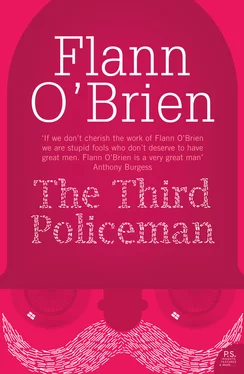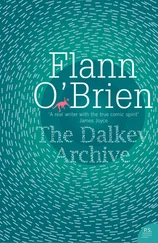He seemed to give a very dry smile at his own joke. I chuckled to encourage him.
‘I gave them all a strict examination, weighed them and viewed them from all angles of the compass. I asked myself how I came to commit them, where I was and whom I was with when I came to do them.’
This is very wholesome stuff, every word a sermon in itself. Listen very carefully. Ask him to continue.
‘Continue,’ I said.
I confess I felt a click inside me very near my stomach as if Joe had put a finger to his lip and pricked up a pair of limp spaniel ears to make sure that no syllable of the wisdom escaped him. Old Mathers continued talking quietly.
‘I discovered,’ he said, ‘that everything you do is in response to a request or a suggestion made to you by some other party either inside you or outside. Some of these suggestions are good and praiseworthy and some of them are undoubtedly delightful. But the majority of them are definitely bad and are pretty considerable sins as sins go. Do you understand me?’
‘Perfectly.’
‘I would say that the bad ones outnumber the good ones by three to one.’
Six to one if you ask me.
‘I therefore decided to say No henceforth to every suggestion, request or inquiry whether inward or outward. It was the only simple formula which was sure and safe. It was difficult to practise at first and often called for heroism but I persevered and hardly ever broke down completely. It is now many years since I said Yes. I have refused more requests and negatived more statements than any man living or dead. I have rejected, reneged, disagreed, refused and denied to an extent that is unbelievable.’
An excellent and original régime. This is all extremely interesting and salutary, every syllable a sermon in itself. Very very wholesome.
‘Extremely interesting,’ I said to old Mathers.
‘The system leads to peace and contentment,’ he said. ‘People do not trouble to ask you questions if they know the answer is a foregone conclusion. Thoughts which have no chance of succeeding do not take the trouble to come into your head at all.’
‘You must find it irksome in some ways,’ I suggested. ‘If, for instance, I were to offer you a glass of whiskey…’
‘Such few friends as I have,’ he answered, ‘are usually good enough to arrange such invitations in a way that will enable me to adhere to my system and also accept the whiskey. More than once I have been asked whether I would refuse such things.’
‘And the answer is still NO?’
‘Certainly.’
Joe said nothing at this stage but I had the feeling that this confession was not to his liking; he seemed to be uneasy inside me. The old man seemed to get somewhat restive also. He bent over his teacup with abstraction as if he were engaged in accomplishing a sacrament. Then he drank with his hollow throat, making empty noises.
A saintly man.
I turned to him again, fearing that his fit of talkativeness had passed.
‘Where is the black box which was under the floor a moment ago?’ I asked. I pointed to the opening in the corner. He shook his head and did not say anything.
‘Do you refuse to tell me?’
‘No.’
‘Do you object to my taking it?’
‘No.’
‘Then where is it?’
‘What is your name?’ he asked sharply.
I was surprised at this question. It had no bearing on my own conversation but I did not notice its irrelevance because I was shocked to realize that, simple as it was, I could not answer it. I did not know my name, did not remember who I was. I was not certain where I had come from or what my business was in that room. I found I was sure of nothing save my search for the black box. But I knew that the other man’s name was Mathers, and that he had been killed with a pump and spade. I had no name.
‘I have no name,’ I replied.
Then how could I tell you where the box was if you could not sign a receipt? That would be most irregular. I might as well give it to the west wind or to the smoke from a pipe. How could you execute an important Bank document?’
‘I can always get a name,’ I replied. ‘Doyle or Spaldman is a good name and so is O’Sweeny and Hardiman and O’Gara. I can take my choice. I am not tied down for life to one word like most people.’
‘I do not care much for Doyle,’ he said absently.
The name is Ban. Signor Bari, the eminent tenor. Five hundred thousand people crowded the great piazza when the great artist appeared on the balcony of St Peter’s Rome.
Fortunately these remarks were not audible in the ordinary sense of the word. Old Mathers was eyeing me.
‘What is your colour?’ he asked.
‘My colour?’
‘Surely you know you have a colour?’
‘People often remark on my red face.’
‘I do not mean that at all.’
Follow this closely, this is bound to be extremely interesting. Very edifying also.
I saw it was necessary to question old Mathers carefully.
‘Do you refuse to explain this question about the colours?’
‘No,’ he said. He slapped more tea in his cup.
‘No doubt you are aware that the winds have colours,’ he said. I thought he settled himself more restfully in his chair and changed his face till it looked a little bit benign.
‘I never noticed it.’
‘A record of this belief will be found in the literature of all ancient peoples. 4 There are four winds and eight sub-winds, each with its own colour. The wind from the east is a deep purple, from the south a fine shining silver. The north wind is a hard black and the west is amber. People in the old days had the power of perceiving these colours and could spend a day sitting quietly on a hillside watching the beauty of the winds, their fall and rise and changing hues, the magic of neighbouring winds when they are inter-weaved like ribbons at a wedding. It was a better occupation than gazing at newspapers. The sub-winds had colours of indescribable delicacy, a reddish-yellow half-way between silver and purple, a greyish-green which was related equally to black and brown. What could be more exquisite than a countryside swept lightly by cool rain reddened by the south-west breeze!’
‘Can you see these colours?’ I asked.
‘No.’
‘You were asking me what my colour was. How do people get their colours?’
‘A person’s colour,’ he answered slowly, ‘is the colour of the wind prevailing at his birth.’
‘What is your own colour?’
‘Light yellow.’
‘And what is the point of knowing your colour or having a colour at all?’
‘For one thing you can tell the length of your life from it. Yellow means a long life and the lighter the better.’
This is very edifying, every sentence a sermon in itself. Ask him to explain.
‘Please explain.’
‘It is a question of making little gowns,’ he said informatively.
‘Little gowns?’
‘Yes. When I was born there was a certain policeman present who had the gift of wind-watching. The gift is getting very rare these days. Just after I was born he went outside and examined the colour of the wind that was blowing across the hill. He had a secret bag with him full of certain materials and bottles and he had tailor’s instruments also. He was outside for about ten minutes. When he came in again he had a little gown in his hand and he made my mother put it on me.’
‘Where did he get this gown?’ I asked in surprise.
‘He made it himself secretly in the backyard, very likely in the cowhouse. It was very thin and slight like the very finest of spider’s muslin. You would not see it at all if you held it against the sky but at certain angles of the light you might at times accidentally notice the edge of it. It was the purest and most perfect manifestation of the outside skin of light yellow. This yellow was the colour of my birth-wind.’
Читать дальше






![О Генри - Бляха полицейского О’Руна [The Badge of Policeman O'Roon]](/books/405347/o-genri-blyaha-policejskogo-o-runa-the-badge-of-po-thumb.webp)





